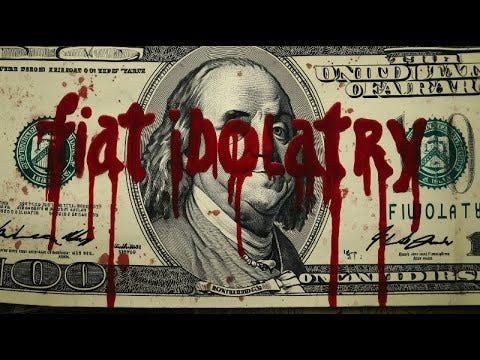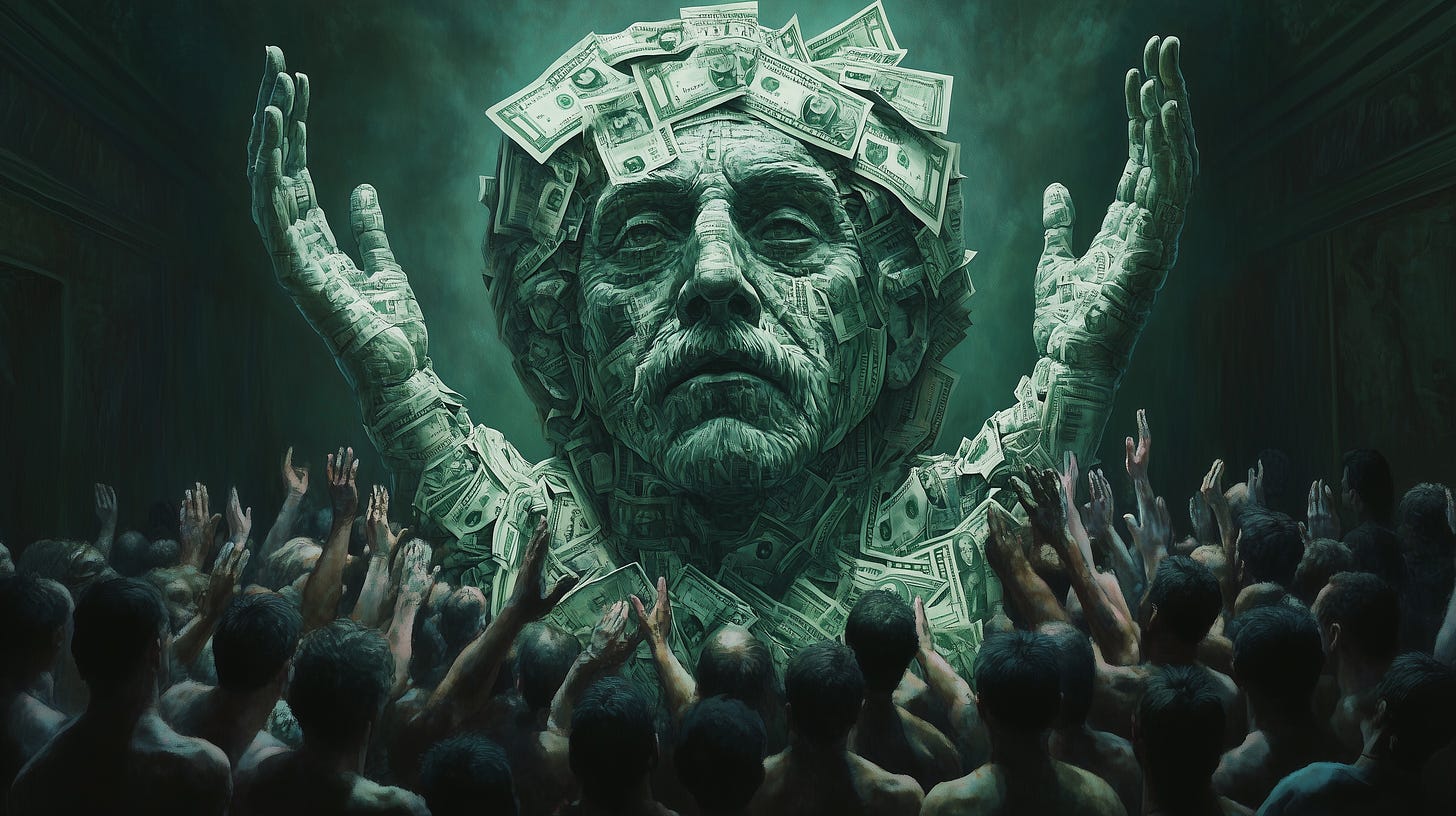In a world where money is nothing more than numbers on a screen and promises made by governments, we find ourselves in a dangerous situation. The foundation of our financial system is built not on tangible value, but on the collective belief in a currency backed by nothing. This isn’t just a superficial issue—it’s a spiritual crisis. Fiat money, decreed by the government and printed at will, masquerades as wealth, but it siphons away human energy and trust, leaving behind a hollow shell of promises that can never be fulfilled.
The most dangerous part? It’s subtle. Slowly, almost imperceptibly, people of faith—those who should be the most vigilant against deception—are led into a state of hypnosis. Propaganda becomes a lullaby, softly reassuring them that their trust belongs not in divine providence but in the hands of the state. Their wealth, their energy, their very essence is stored in a system that has no real value. And just like that, their faith shifts—from God to the government, from spiritual truths to empty symbols of power.
In Part 1: Esoteric Money of The Fiat Chronicles, we explored the hidden symbols and meanings behind fiat currency, revealing how these symbols are designed to deceive and control. In Part 2: Propaganda Machine, we delved deeper into how fiat money amplifies certain voices in society while muting others, shaping reality through endless propaganda. Now, in Part 3: Fiat Idolatry, we examine how fiat money leads society into widespread idolatry.
Fiat Money Leads Society into Idolatry
Fiat money is not just an economic tool; it is the very mechanism that leads society into idolatry. When money is created out of nothing and sustained purely by belief, that belief transforms into a form of worship. Fiat currency gradually redirects people’s faith away from God and toward the state, making the state and its mechanisms the objects of worship.
As the state captures human energy in the form of money and trust in the form of belief, it channels society’s devotion into idols: the insatiable pursuit of material wealth through consumerism, the blind allegiance to state power, the obsession with brands that define our worth, and the worship of celebrity culture that shapes our desires. Fiat money becomes the cornerstone of a system that turns people’s attention away from spirituality, values, morality and principles, leading them to worship hollow idols.
In this segment, we’ll explore how fiat money facilitates this idolatry, while the symptoms of moral and spiritual decay continue to erode society. We’ll also examine the individual’s role in choosing to serve these false idols and how this perpetuates the very system that disconnects us from our values.
Subtle Propaganda and the Hijacking of Faith
The fiat system operates on more than just economics—it thrives through carefully crafted propaganda. Over time, this messaging works to subtly redirect people’s faith away from divine provision and toward the state. Inflation and economic hardship play a key role in this process. As the cost of living rises and people struggle to meet their basic needs, they increasingly turn to the state for relief, unknowingly placing their trust in a system that thrives on their dependency.
Governments create a fiat matrix where citizens have no alternative but to operated within this deceptive construct to survive. The constant stream of consumer messaging reinforces this trust, convincing society that their worth is tied to the currency they hold. This belief system, sustained through the repetitive nature of advertisements, social media, and state narratives, creates a hypnotic effect.
As a result, people pour their human energy—through labor, spending, and saving—into this system, unknowingly fueling the very deception that undermines spiritual foundations. Trust in fiat money, bolstered by state-backed assurances, perpetuates the cycle, making it harder to break free from the false promises of material wealth and state protection.
Faith Becomes a Tool for Powering Fiat
Fiat money, at its core, is a system that relies entirely on collective belief. Just as faith fuels spirituality and connects individuals to something higher, in the fiat system, that same faith is harnessed to power a system of lies. Fiat currency has no inherent value—its existence depends on trust in its worth. This collective belief becomes the engine that keeps the system running, even as it slowly corrodes the moral and spiritual foundations of society.
Investment of faith in this false system results in making it stronger. Fiat money, rather than reflecting real value created by labor and goods, becomes a symbol of societal control. It feeds off trust in a way that subtly replaces genuine spiritual beliefs with loyalty to a system built on manipulation. Over time, this faith, misplaced in the fiat structure, reinforces not only the financial imbalance but also moral and spiritual decline.
As individuals continue to work, spend, and save in this system, they inadvertently contribute to the decay, empowering a structure that strips away the deeper values anchoring society. Faith, directed towards spiritual growth and integrity, is redirected to sustain a hollow, debt-backed economy, further entrenching the deception.
Consumerism: Worship of Material Things
The fiat system thrives by promoting material wealth as the ultimate goal, leading to a trap of consumerism. In this worldview, possessions and status become the measure of success, while spiritual fulfillment is sidelined. This is not accidental—it is a carefully crafted mechanism that shifts society's focus from higher values to the endless pursuit of material gains.
Debt-fueled consumerism, central to this system, creates the illusion of wealth. Credit and easy access to loans allow individuals to indulge in lifestyles beyond their means, presenting an outward image of success and abundance. But beneath this facade lies financial instability. Individuals are encouraged to believe that worth is defined by what they own, not who they are nor the values they hold.
This mindset mirrors the worship of false gods. Just as in ancient times, when idols were revered in place of a higher power, today manifestations of wealth and success are worshiped. Spiritual fulfillment is downplayed and dismissed, while unattainable images of prosperity through overspending and debt are at the forefront. In this distorted system, the accumulation of material goods takes the place of deeper, more meaningful pursuits, driving a wedge between individuals and their spiritual core.
By redirecting faith toward consumerism, the fiat system keeps individuals trapped in a cycle of dissatisfaction, where the pursuit of wealth replaces the pursuit of truth.
State Worship: Trust in False Institutions
Once faith in fiat money is established, the next step is the subtle but powerful elevation of the state to god-like status. As wealth, security, and a future are entrusted to a currency backed by the state, the belief in the system grows deeper. Over time, this belief expands beyond the financial realm, transforming into a form of worship of the state itself. Fiat money becomes the conduit through which the state controls not just economies but the very fabric of society.
State-run institutions, funded by fiat currency, become the arbiters of truth and social norms. Governments, through education, media, and policy, shape public opinion and dictate how society functions. Citizens are taught to place their faith in these institutions for their well-being, safety, and even moral guidance. Policies financed by endless money printing—such as wars, social programs, and surveillance—are justified as necessary for the greater good, further reinforcing the state’s control over both the financial and spiritual lives of individuals.
In this system, the state takes on the role of a false deity. It commands obedience not through direct coercion but through its omnipresence in everyday life—providing, regulating, and dictating. As a result, trust shifts from divine or personal spiritual principles to the state, relying on it for answers to both material and existential questions. By controlling both the economic and spiritual aspects of society, the state becomes the ultimate authority, shaping not only how people live but also what they believe.
Brand Worship: Defining Identity Through Consumerism
In the world of fiat-driven consumerism, corporate brands have become the modern-day idols of worship. Personal identity, once rooted in values, beliefs, and character, is now increasingly defined by the logos and products consumed. Brands offer an external validation, a sense of belonging, and a symbol of success, which many use to shape their self-worth. The more a person is able to acquire and display these symbols of status, the more they feel they fit into the cultural narrative of success and fulfillment.
Social media and advertising fuel this brand worship, relentlessly promoting the idea that worth can be purchased. Consumers are bombarded with images of luxury goods, designer clothing, and the latest tech—messages that equate having these items with being valuable, happy, or important. The more individuals consume, the more they chase external validation, trading away inner identity for the shallow approval of others. In this environment, personal value is no longer measured by integrity or spiritual growth but by how well one adheres to the image curated by consumer culture.
Brand worship, then, is not simply a reflection of materialism but a hollowing out of authentic identity. Rather than expressing true individuality or cultivating deeper spiritual and emotional well-being, identity is constructed through external markers. What remains is a shell—a projection of self built around logos and products, driven by the need for social approval and external recognition. This worship of brands is yet another facet of the idolatry promoted by the fiat system, keeping individuals disconnected from their true essence and locked into the cycle of consumption and debt.
Celebrity Worship: The Manufactured Idols
In the fiat system, celebrities are elevated to the status of modern-day demigods, becoming the human embodiment of the idolatry that fuels this hollow society. These celebrities, manufactured and maintained by the very system that thrives on debt and consumption, act as conduits for the fiat narrative. They sell their image, their influence, and often their principles, to promote a culture of materialism and blind acceptance. In return, they receive fame, fortune, and societal adoration, becoming idols that millions of people worship without question.
Celebrity worship is not just about entertainment or admiration for talent. It’s about creating a distraction—a carefully crafted spectacle that keeps society fixated on superficial ideals like beauty, wealth, and success, rather than pursuing deeper spiritual truths. These celebrities promote the fiat system’s values, reinforcing the belief that happiness and fulfillment come from external achievements and material possessions. Whether it's the glamorous lifestyle they portray or the luxury goods they endorse, they lead the masses further away from spiritual introspection and toward an obsession with surface-level success.
By idolizing these manufactured figures, society is kept in a state of spiritual distraction. People no longer look inward to find their true purpose or meaning; instead, they are conditioned to aspire to the artificial image of success projected by celebrity culture. In this way, the fiat system uses celebrities as tools to perpetuate a culture of consumption and materialism, further deepening society's disconnection from authentic values and spiritual well-being.
Consequences of Fiat Idolatry
The various forms of idolatry promoted by the fiat system—consumerism, state worship, brand worship, and celebrity worship—inevitably lead to profound moral and spiritual decay. Each of these false idols pulls individuals further away from foundational values such as integrity, honesty, and humility. In their place, superficial pursuits dominate: material wealth, social status, and outward appearances become the defining markers of success, while inner virtues are cast aside.
As society chases these illusions of success, the consequences ripple outward. The relentless pursuit of material wealth, driven by debt and the empty promises of consumer culture, creates a spiritual drain and disconnect. Instead of cultivating a life rooted in meaningful relationships, community, and personal growth, individuals become consumed by the need to accumulate and project status. The result is a culture that values image over substance, appearances over authenticity.
This obsession with external validation creates an empty and valueless society—one where people are spiritually bankrupt, seeking fulfillment in things that can never truly satisfy. The deeper values that once anchored communities—compassion, humility, and truth—are overshadowed by the relentless drive for more. In this way, the fiat system’s idolatry leads to a widespread erosion of moral character, leaving individuals and society as a whole disconnected from what truly matters.
As discussed in *Part 1: Esoteric Money* and *Part 2: Propaganda Machine* the first step toward freeing oneself from the grip of the fiat system is awareness. Recognizing the deep moral and spiritual deterioration caused by this system is essential to breaking free from its influence. The solution begins by understanding how fiat money drives consumerism, state worship, brand obsession, and celebrity idolatry, pulling society away from meaningful values and replacing them with shallow pursuits.
To break this cycle, individuals must actively reject these false idols. It’s not enough to acknowledge their existence; one must consciously turn away from the endless chase for material wealth, status, and validation through brands and celebrities. By rejecting consumerism, state worship, and the distraction of celebrity culture, individuals reclaim their spiritual integrity and personal sovereignty.
Bitcoin offers a potential way out of this system. By separating money from the state, Bitcoin challenges the power of the fiat system, eliminating the endless manipulation made possible by the magic money printer. Its decentralized, scarce, and transparent nature offers an alternative to the deception and corruption inherent in fiat currency. By embracing Bitcoin, individuals can opt for a system grounded in truth and scarcity rather than one fueled by debt and illusion.
Ultimately, the path forward begins with recognizing the spiritual and moral toll of the fiat system and making a conscious decision to live in alignment with deeper, more meaningful values. This is not just a financial revolution but a personal and spiritual one, where power and sovereignty can be reclaimed by rejecting the false idols of modern society.
Looking Ahead to Part 4: The Fiat Apocalypse
In the final episode of *The Fiat Chronicles*, titled *The Fiat Apocalypse*, we will explore the inevitable collapse of the fiat system and the looming dangers that accompany it. The fragile foundation of debt-backed currency is already beginning to crumble, and as history has shown, empires built on unstable financial systems eventually fall.
This collapse won’t come quietly. Endless wars, driven by the need to maintain the fiat system’s dominance, will only accelerate the decay. As de-dollarization unfolds and countries move away from reliance on the U.S. dollar, the cracks in the system will become impossible to ignore. The consequences will be far-reaching, impacting not only economies but the social, moral, and spiritual fabric of society.
*The Fiat Apocalypse* will examine these unfolding events and highlight the profound truths that will emerge as the fiat system collapses, paving the way for a new chapter in humanity’s financial and spiritual journey.






